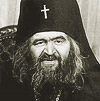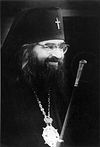

| Previous day | Next day |
| Old Style
June 19
|
Sunday |
New Style
July 2
|
|
4th Sunday after Pentecost.
Tone 3.
Fast of the Holy Apostles. |
Fish, wine and oil allowed.
|
![]() Holy Apostle Jude, the Brother of the Lord (ca. 80).
Holy Apostle Jude, the Brother of the Lord (ca. 80). ![]() St. Job, patriarch of Moscow (1607).
St. Job, patriarch of Moscow (1607). ![]() St. John (Maximovitch), archbishop of Shanghai and San Francisco (1966).
St. John (Maximovitch), archbishop of Shanghai and San Francisco (1966).
Martyr Zosimas the Soldier, at Antioch in Pisidia (ca. 89-117). St. Paisius the Great, of Egypt (5th c.). St. John the Solitary, of Jerusalem (6th c.). St. Barlaam, monk of Shenkursk (1462). St. Paisius the Bulgarian, of Hilandar, Mt. Athos (18th c.). Synaxis of the Saints of the Pskov Caves Monastery.
“Korobeinikov” (Kazan) Icon of the Most Holy Theotokos (1938).
Holy Myrrh-bearer Mary, mother of Apostle James (1st c.). St. Macarius of Petra (4th c.). St. Romuald, abbot of Camaldoli (Ravenna) (1027). Hieromartyr Asyncretus.
Repose of Schemamonk Theoktist, desert-dweller, of Valaam (1863) and Archbishop Leonty of Chile (1971).
Thoughts for Each Day of the Year
According to the Daily Church Readings from the Word of God
By St. Theophan the Recluse

Fourth Sunday After Pentacost. [Rom. 6:18-23; Matt. 8:5-13]
What faith the centurion has! The Lord Himself marvelled. The essence of this faith is that he confessed the Lord to be the God of all things, an all-powerful sovereign and master of all that exists; for this reason he beseeched, speak the word only, and my servant shall be healed. I believe that everything is under Your authority and everything obeys Your slightest beckoning. The Lord requires the same faith of us, as well. He who has this faith knows no lack, and whatsoever he asks, he receives. Thus has the Lord Himself promised. Oh, when will we have if only a little of such faith! But this faith is also a gift; we must ask for it as well, and ask for it with faith. Let us ask for it, with a feeling of need for it, ask for it continually, fervently, at the same time aiding its unfolding within us through corresponding thoughts, and most of all by submitting to God’s commandments.
Articles
 Opening of the Relics, and Glorification of St. John MaximovitchArchpriest Peter Perekrestov"He is incorrupt! His relics are incorrupt!" |
 Martyr Zosimus the Soldier at Antioch, in PisidiaThe Martyr Zosimus lived in the city of Apollona (Thrace) during the reign of Trajan (89-117), the persecutor of Christians. |
 St John the Solitary of JerusalemSaint John the Hermit was an ascetic in Palestine. He passed his days in fasting and prayer in a cave near Jerusalem. |















